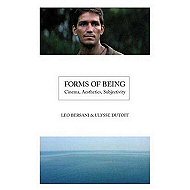|
Forms of Being: Cinema, Aesthetics, Subjectivity
|
|
Leo Bersani & Ulysse Dutoit
|

|

In each of the films discussed in this book - Le Mepris (Jean-Luc Godard, 1963), All About My Mother (Pedro Almodovar, 1999), The Thin Red Line (Terrence Malick, 1998) - something extraordinary is proposed. Or if not proposed, then shown, visually, by stranger and more powerful means than narrative or argument.
It is a matter in every case of re-imagining the relationship between subjectivity and the world.
At the end of Le Mepris a conventional account of doomed and tragic love is displaced by images of nature as just a space of almost blank appearances, which are beyond all human desire and psychological entanglements.
All About My Mother veers away from imprisoning forms of identity, family and gender. It begins, hesitantly, to depict other kinds of sociability - more fluid ones that do not rely on coercion or obligation.
Most remarkably, The Thin Red Line moves to eradicate discourse itself - to approach the world and the beings in it with a neutral gaze, without presupposing a hierarchy of relationships. In its use of close-ups and in its patterns of visual correspondence between human and non-human life, The Thin Red Line becomes abstract and startlingly indifferent to its violent subject-matter - as if, according to Leo Bersani and Ulysse Dutoit, an impassive, wholly receptive looking were the most appropriate, the most ethically justifiable, the least enraged and possessive way to appreciate the possibilities of existing in a world which is, beyond the conflict that is brought into it, not at war with its inhabitants. […]
Leo Bersani was until recently the Class of 1950 Professor of French and Ulysse Dutoit is Lecturer in Film, both at the University of California, Berkeley. They are the authors of Forms of Violence: Narrative in Assyrian Art and Modern Culture (1985), Arts of Impoverishment: Beckett, Rothko, Resnais (1993), Caravaggio's Secrets (1998), and a monograph on Derek Jarman's Caravaggio in the BFI Modern Classics series (1999).
|
|
